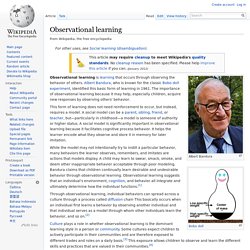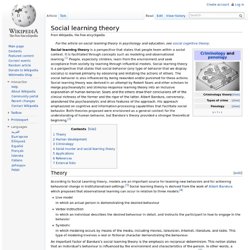

Observational learning. Observational learning is learning that occurs through observing the behavior of others.

Albert Bandura, who is known for the classic Bobo doll experiment, identified this basic form of learning in 1961. The importance of observational learning because it may help, especially children, acquire new responses by observing others' behavior. This form of learning does not need reinforcement to occur, but instead, requires a model. A social model can be a parent, sibling, friend, or teacher, but—particularly in childhood—a model is someone of authority or higher status. A social model is significantly important in observational learning because it facilitates cognitive process behavior.
While the model may not intentionally try to instill a particular behavior, many behaviors the learner observes, remembers, and imitates are actions that models display. Culture plays a role in whether observational learning is the dominant learning style in a person or community. Bobo doll experiment. The Bobo doll experiment was the collective name of the experiments conducted by Albert Bandura in 1961 and 1963 studying children's behavior after watching an adult model act aggressively towards a Bobo doll.

There are different variations of the experiment. The most notable experiment measured the children's behaviour after seeing the model get rewarded, punished or experience no consequence for beating up the bobo doll. This experiment is the empirical demonstration of Bandura's social learning theory. It shows that people not only learn by being rewarded or punished itself (behaviorism), they can learn from watching somebody being rewarded or punished, too (observational learning). These experiments are important because they sparked many more studies on the effects of observational learning and they have practical implication, e.g. how children can be influenced watching violent media. The Bobo doll[edit] Bobo doll Experiment in 1961[edit] Method[edit] Results[edit] Social learning theory. Is a perspective that states that people learn within a social context.

It is facilitated through concepts such as modeling and observational learning. [ 1 ] [ edit ] Theory According to Social Learning theory, models are an important source for learning new behaviors and for achieving behavioral change in institutionalized settings. [ 2 ] Social learning theory is derived from the work of Albert Bandura which proposed that observational learning can occur in relation to three models: [ 3 ] • Live model – in which an actual person is demonstrating the desired behaviour • Verbal instruction – in which an individual describes the desired behaviour in detail, and instructs the participant in how to engage in the behavior • Symbolic – in which modeling occurs by means of the media, including movies, television, Internet, literature, and radio. An important factor of Bandura’s social learning theory is the emphasis on reciprocal determinism. 1. 2. 3. 4.
. [ edit ] Criminology [ edit ] Applications. Gestalt psychology. Gestalt psychology or gestaltism (German: Gestalt – "shape or form") is a theory of mind of the Berlin School.

The central principle of gestalt psychology is that the mind forms a global whole with self-organizing tendencies. This principle maintains that the human mind considers objects in their entirety before, or in parallel with, perception of their individual parts; suggesting the whole is other than the sum of its parts. Gestalt psychology tries to understand the laws of our ability to acquire and maintain meaningful perceptions in an apparently chaotic world. In the domain of perception, Gestalt psychologists stipulate that perceptions are the products of complex interactions among various stimuli.
Contrary to the behaviorist approach to understanding the elements of cognitive processes, gestalt psychologists sought to understand their organization (Carlson and Heth, 2010). Origins[edit] Gestalt therapy[edit] Theoretical framework and methodology[edit] Properties[edit] Reification.